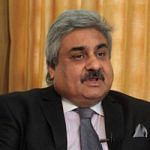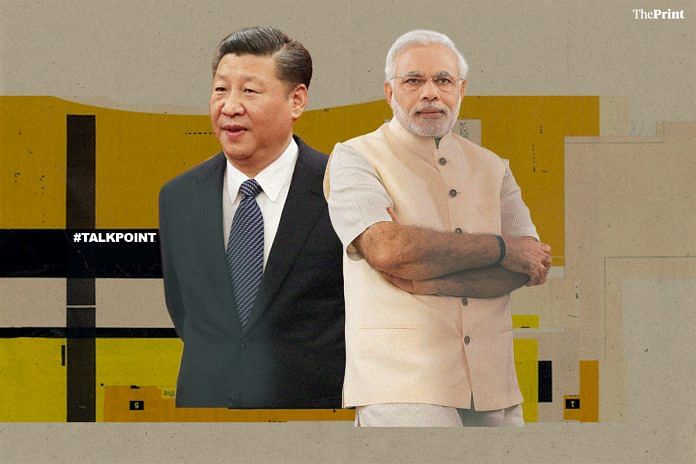PM Modi met President Xi Jinping at the Shanghai Cooperation Organisation summit in Qingdao, where he invited the Chinese leader to India for a Wuhan-like informal summit next year. Jinping accepted the invitation.
ThePrint asks: Can Modi-Xi’s SCO meeting in Qingdao signal a new chapter for India-China ties?
No guarantee of acceptable outcomes from India-China summits

TCA Rangachari
China expert, retired diplomat
“The only correct choice between China and India is to live together in peace and enjoy win-win cooperation” said Xi Jinping at Xiamen on 5 September 2017.
“Both sides should not regard each other as opponents, but make cooperation mainstream of bilateral relations,” responded Modi.
These pronouncements coming in the wake of the 73-day long Doklam standoff from the highest political levels should have helped allay Indian wariness about China’s intentions regarding the unresolved border issue and/or unwillingness to countenance India’s rise.
In the nine months since, these sentiments have been reiterated at the informal summit at Wuhan in April and again at Qingdao during the SCO Summit last week.
Yet misgivings persist, revealing persisting insufficiency of political trust.
Concurrently, both sides acknowledge the advantages of enhancing economic co-operation – bilaterally and multi-laterally – and people-to-people understanding. Here too, there are issues that need to be addressed and resolved for this in-principle agreement to become a sustainable and mutually reinforcing ground reality.
Established global verities are under challenge. The direction and outcome of this phase of transformation remains uncertain. As two large neighbouring Asian countries with a vested interest in peace and stability in the region and the world at large, it makes sense for India and China to work together.
This is no guarantee for acceptable outcomes for our own bilateral political agenda with China. We should be prepared for a separate, relentless exertion to pursue and achieve that.
India-China friendship can only become unequal. It’s in the nature of great power relations
 Manvendra Singh
Manvendra Singh
BJP MLA from Shiv constituency, Rajasthan
The last two surviving civilisations from the ancient world, largest countries in terms of populations, neighbours since millennia, fought only once in all those centuries, and yet the oft repeated question is whether China and India can be friends. More high level summits over the past couple of years than at any time in recent memory, and yet the question persists. And it persists because there are fundamental societal, political and cultural differences between the two largest practitioners of ‘Asian values’.
India’s decline in terms of global political and economic presence preceded that of China by a few hundred years. It’s decline in terms of civilisational output preceded China by many more centuries. Despite possessing all the resources known to humankind both civilisations declined, although the pace varied, and so did the causes. While both had very different encounters with colonialism, what is riveting is how both societies interpreted their decline differently. And how differently both approached resurgence.
China closed in so as to take on the world which it believes has treated the Middle Kingdom unfairly. India integrated with the world while remaining insular in every sense of the word. Now each has arrived at a point in their growth where both believe they have earned a place under the sun. But the fact remains there aren’t seats at the high table which of the neighbours strikes lucky? It is a race sans sentimentality, and the winner takes all.
So China and India can be friends during and after the race, but there will be a winner, after all. And the friendship, then, can only become unequal, for that is the nature of great power relation
Interests are paramount in this globalised & transactional world. Alliances are not
 Anil Wadhwa
Anil Wadhwa
Senior fellow at Vivekananda International Foundation, retired diplomat
Prime Minister Modi’s visit to Qingdao has taken forward the consensus and the understanding reached between him and President Xi Jinping of China at the Wuhan informal summit.
While the Shanghai Cooperation Organisation summit was important, the bilateral meeting between PM Modi and President Xi a day before the Summit was watched closely by analysts. In a “positive and forward looking” meeting, they built upon the momentum, and reached an agreement for President Xi to visit India in 2019 for another Wuhan-style informal summit.
The consensus is important for enhancing mutual understanding on several fronts. First, both sides will continue their efforts to ensure peace and tranquility along the border with the armed forces of two sides continuing to talk to each other. Second, they will jointly take forward a development project in Afghanistan. And last, anew mechanism for people-to-people cooperation will be set up in areas such as art and culture (an effort to be headed by the two foreign ministers).
At Qingdao, both sides also signed two agreements – one on continuing the sharing of hydrological data on the Brahmaputra which will help India in coping with floods, and another on expanding non-basmati rice exports from India to China.
The fact that the G7 meet at the same time in another continent ended in disarray with US President Trump dissociating himself from the declaration will not be lost on the SCO. In this globalised and transactional world, alliances do not matter – interests are paramount.
Modi’s invite a reflection of Delhi’s confidence in dealing with a difficult neighbour

Jyoti Malhotra
Editor, National & Strategic Affairs, ThePrint
It’s a truism in international politics that there can be no permanent friends or enemies, simply interests. Indian politicians, who make or break relationships with antagonistic partners at home with consummate ease, know this better than anyone else. Prime Minister Narendra Modi’s invitation to Chinese president Xi Jinping, in Qingdao over the weekend, inviting him to Delhi for a Wuhan-like informal summit next year, is a reflection of Delhi’s confidence in dealing with a difficult neighbour with which it had a military standoff less than a year ago.
The Qingdao message is clear: Bind China into a series of agreements which will create a series of positive repercussions from which Beijing will not only find it difficult to extricate itself, but also reduce the possibility of a Doklam-like confrontation. So Sushma Swaraj and her counterpart, Wang Yi, will be responsible for promoting people-to-people exchanges, while the defence and public security ministers will travel to Delhi later this year.
In an increasingly turbulent world, in which US president Donald Trump is increasingly reveling in tearing up communiqués, China looks bigger and stronger and more powerful than it otherwise would. Delhi has no option but to manage Beijing’s rising self-confidence, while staying the course with Washington.
Of course this gives Modi the unprecedented opportunity to demonstrate his own solidity and raise India to the status of a regional power. Never forget that the repeated Modi-Xi encounters – another one is coming up in South Africa next month – are being carefully watched in Pakistan, China’s best friend and ally. If India and China can improve ties, what prevents India and Pakistan from doing so?
Compiled by Jyoti Malhotra, Editor, National & Strategic Affairs




India and China are led by powerful, charismatic premiers, with political capital sufficient to forge a more mutually beneficial relationship, not unduly weighed down by the baggage of history. A slow build up of mutual trust dating from PM Rajiv Gandhi’s successful visit and, since 2000, a more swift enlargement of trade – although the imbalance of $ 63 billion is unsustainable and needs to be reduced substantially – was undone in the last few years, culminating in Dokalam, which was more symptom than disease. Both sides realised a reset was necessary. Some have spoken of the need to forge a new modus vivendi, one which honestly acknowledges how the power differential has widened in the last thirty years. 2. The quad / containment of China represents one school of thought. It may be the more realistic, hard headed, mindful of half a century of distrust, compounded by China’s all weather friendship with Pakistan. Lurking below the surface is the possibility of having to fight a two front war, when nuclear deterrence suggests that even a single front war would be unwelcome. At this stage of our economic development, it does not represent the best possible outcome for Indian diplomacy. 3. Relations between great powers are not crafted and refashioned in summits. The test of where the relationship is headed is not how many times the leaders have met. Today, OBOR / BRI is China’s signature initiative to stamp its imprint on infrastructure creation in Eurasia, with SCO and CPEC at its heart. For India to find a way to join this magnificent series of interconnected projects – with suitable caveats regarding our claim over PoK – would truly mean that a new synergy is being created between the two countries. 4. With or without President Trump, who mentioned India at the G 7 summit, a reset with the US was equally warranted. Important bilateral relationships with Russia, Iran, others were being affected by a monochromatic vision of foreign policy. That recalibration seems to be underway.